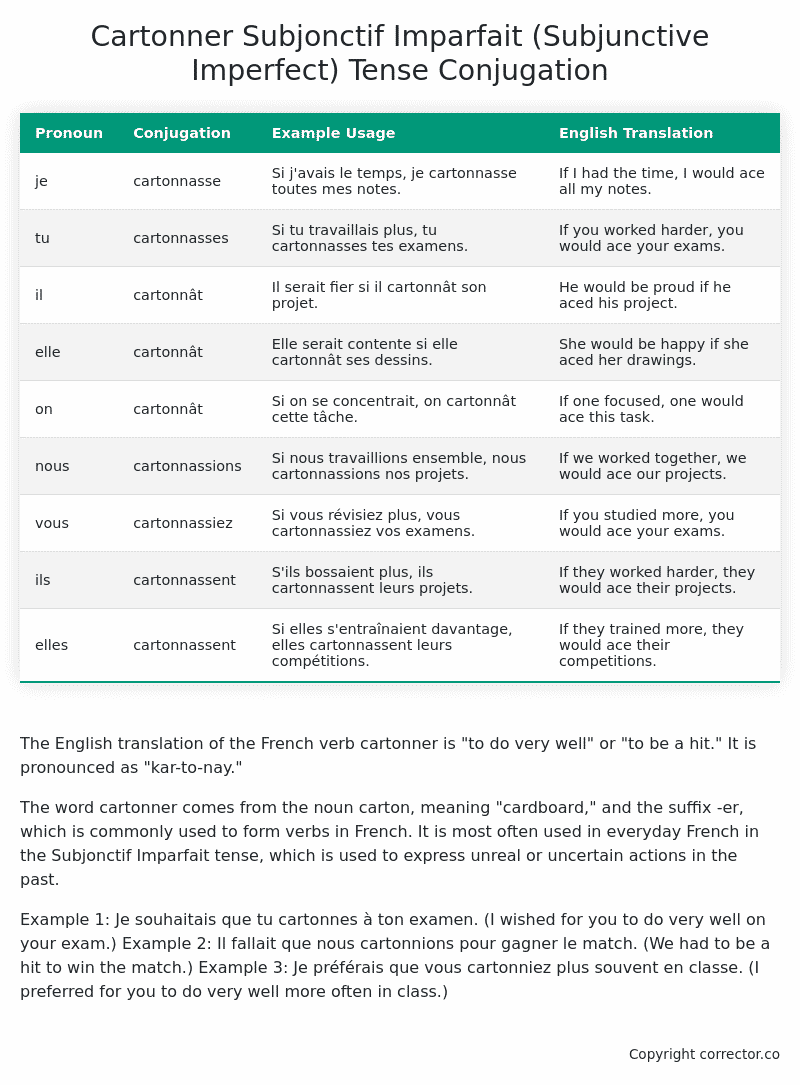Subjonctif Imparfait (Subjunctive Imperfect) Tense Conjugation of the French Verb cartonner
Introduction to the verb cartonner
The English translation of the French verb cartonner is “to do very well” or “to be a hit.” It is pronounced as “kar-to-nay.”
The word cartonner comes from the noun carton, meaning “cardboard,” and the suffix -er, which is commonly used to form verbs in French. It is most often used in everyday French in the Subjonctif Imparfait tense, which is used to express unreal or uncertain actions in the past.
Example 1: Je souhaitais que tu cartonnes à ton examen. (I wished for you to do very well on your exam.)
Example 2: Il fallait que nous cartonnions pour gagner le match. (We had to be a hit to win the match.)
Example 3: Je préférais que vous cartonniez plus souvent en classe. (I preferred for you to do very well more often in class.)
Table of the Subjonctif Imparfait (Subjunctive Imperfect) Tense Conjugation of cartonner
| Pronoun | Conjugation | Example Usage | English Translation |
|---|---|---|---|
| je | cartonnasse | Si j’avais le temps, je cartonnasse toutes mes notes. | If I had the time, I would ace all my notes. |
| tu | cartonnasses | Si tu travaillais plus, tu cartonnasses tes examens. | If you worked harder, you would ace your exams. |
| il | cartonnât | Il serait fier si il cartonnât son projet. | He would be proud if he aced his project. |
| elle | cartonnât | Elle serait contente si elle cartonnât ses dessins. | She would be happy if she aced her drawings. |
| on | cartonnât | Si on se concentrait, on cartonnât cette tâche. | If one focused, one would ace this task. |
| nous | cartonnassions | Si nous travaillions ensemble, nous cartonnassions nos projets. | If we worked together, we would ace our projects. |
| vous | cartonnassiez | Si vous révisiez plus, vous cartonnassiez vos examens. | If you studied more, you would ace your exams. |
| ils | cartonnassent | S’ils bossaient plus, ils cartonnassent leurs projets. | If they worked harder, they would ace their projects. |
| elles | cartonnassent | Si elles s’entraînaient davantage, elles cartonnassent leurs compétitions. | If they trained more, they would ace their competitions. |
Other Conjugations for Cartonner.
Le Present (Present Tense) Conjugation of the French Verb cartonner
Imparfait (Imperfect) Tense Conjugation of the French Verb cartonner
Passé Simple (Simple Past) Tense Conjugation of the French Verb cartonner
Passé Composé (Present Perfect) Tense Conjugation of the French Verb cartonner
Futur Simple (Simple Future) Tense Conjugation of the French Verb cartonner
Futur Proche (Near Future) Tense Conjugation of the French Verb cartonner
Plus-que-parfait (Pluperfect) Tense Conjugation of the French Verb cartonner
Passé Antérieur (Past Anterior) Tense Conjugation of the French Verb cartonner
Futur Antérieur (Future Anterior) Tense Conjugation of the French Verb cartonner
Subjonctif Présent (Subjunctive Present) Tense Conjugation of the French Verb cartonner
Subjonctif Passé (Subjunctive Past) Tense Conjugation of the French Verb cartonner
Subjonctif Imparfait (Subjunctive Imperfect) Tense Conjugation of the French Verb cartonner (this article)
Subjonctif Plus-que-parfait (Subjunctive Pluperfect) Tense Conjugation of the French Verb cartonner
Conditionnel Présent (Conditional Present) Tense Conjugation of the French Verb cartonner
Conditionnel Passé (Conditional Past) Tense Conjugation of the French Verb cartonner
L’impératif Présent (Imperative Present) Tense Conjugation of the French Verb cartonner
L’infinitif Présent (Infinitive Present) Tense Conjugation of the French Verb cartonner
Struggling with French verbs or the language in general? Why not use our free French Grammar Checker – no registration required!
Get a FREE Download Study Sheet of this Conjugation 🔥
Simply right click the image below, click “save image” and get your free reference for the cartonner Subjonctif Imparfait tense conjugation!

Cartonner – About the French Subjonctif Imparfait (Subjunctive Imperfect) Tense
Formation
Common Everyday Usage Patterns
Interactions with Other Tenses
Subjonctif Présent
Indicatif Passé Composé
Conditional
Conditional Perfect
Summary
I hope you enjoyed this article on the verb cartonner. Still in a learning mood? Check out another TOTALLY random French verb conjugation!


